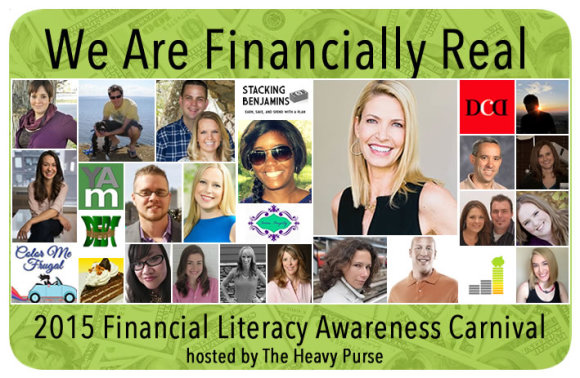This post is part of the Financial Literacy Awareness Carnival. The carnival was coordinated by our good friend Shannon. Check out her post here.
 Be honest. Are you “real” about your finances?
Be honest. Are you “real” about your finances?
In other words, do you really understand your finances?
Do you know where you currently sit financially and where you are going?
If you’re answer is no, you are not alone.
Just a couple weeks ago I shared an infographic about people’s perceptions of what affects their credit score. The survey data showed that most have very little understanding of what affects their credit score. This was true even among those who recently checked their credit report.
The reality of the situations is that most people do not prioritize financially literacy – unless something bad happens. When something bad happens, such as an expensive car repair or a large doctor bill, all of a sudden financial literacy becomes a priority. When things are going good? Not so much.
The challenge I have for you is this: get “real” about your finances – NOW! Regardless of whether things are currently going good, “okay”, or bad for you financially, now is the time to get real about your situation and set yourself up for success long-term.
Today I want to talk about 4 specific action items to take if you want to get real about your finances.
1) Commit to Prioritizing Financial Literacy
Committing to prioritizing financial literacy is the absolute first thing someone should do if they want to get real about their finances. It starts with creating time and space to become financially literate.
There are a few specific things you can do to get in the habit of gaining financial literacy. For example, you can set aside a specific time each week to learn more about financial topics. This can include reading personal finance blogs like this one, reviewing finances with a significant other, or reading finance books.
The more you read and learn about financial topics the better. You don’t have to agree with everything you read; after all, there will be many bloggers and authors who have opposing views on a particular topic. Some popular personal finance books are The Total Money Makeover by Dave Ramsey, The Money Book for the Young, Fabulous & Broke by Suze Orman, and Personal Finance in Your 20s For Dummies by Eric Tyson.
2) Commit to reviewing your finances regularly
A second action item you can take to becoming financially literate is committing to review your finances regularly. Reviewing your finances consists of the following:
- List out your debts – Most people have a general idea of how much debt they are in, but few have a detailed understanding of their debt. Listing out all your student loans, mortgage, and consumer debt can be eye-opening. Having an understanding of your debts – including the number of payments remaining and interest rate – are essential for financial literacy.
- Track income and expense – Tracking all your income and spending is time-consuming, but it’s also an essential activity for anyone who desires to be financially literate. After all, how can someone improve their finances if they are unaware of exactly what they spend their money on?
- Understand your savings and investments – Perhaps you are currently saving and investing nothing, in which case this action item will be an easy one for you. If you are savings and investing, it’s important to realize exactly how much you are setting aside each month and what your short- and long-term goals are for your savings and investments. Remember: saving something – anything – is better than saving nothing.
After reading these three suggested regular activities you can see why people de-prioritize financial literacy: it’s time consuming!
What I’ve found is that the toughest part is getting in the habit of reviewing your finances. Once you get in the habit and find a system that works for you it becomes much easier.

3) Commit to plugging any “financial holes”
Once you’ve gotten into the habit of reviewing your finances regularly, you can work on the next financial literacy action item: plugging any “financial holes” in your finances. Plugging financial holes can include:
- Knocking out low-hanging fruit – If you listed out your debts and loans as suggested you may have realized – perhaps for the first time – that you have a high-interest loan. If you have high-interest debt consider focusing on paying it down as quickly as possible. Other low-hanging fruit may include subscriptions to services you don’t use anymore or non-participation in an employee benefit program like an employee stock purchase program.
- Cut Expenses – After reviewing your expenses you may have found a few areas that you spend a lot more money than you expected. For example, perhaps you go to Starbucks every morning and spend well over $100 a month on coffee. Brewing coffee at home a few days a week instead of stopping at Starbucks could make a material difference in your finances over time.
- Increase Income – Here at Young Adult Money we are a bit biased towards increasing income. After all, landing a promotion and getting an additional $10,000 a year could make a huge impact on your finances. Increasing income doesn’t necessarily mean making more money at your 9-5. Side hustles & side businesses are becoming an increasingly popular way for people to pay down debt and get ahead financially.
Plugging financial holes may end up requiring much less work than you expected. Simply being more aware of your finances can drastically improve your financial situation.
4) Commit to a better future
You’ve prioritized and made time for becoming financially literate, started to review your finances regularly, and committed to plugging financial holes. What’s next? Committing to a better future.
Financial literacy is empowering because finances touches all areas of our lives. Finances can prohibit or enable dreams to come true. Finances can create or alleviate stress. Finances underlie virtually everything in life.
Aligning your finances with values is one way to leverage financial literacy for a better future. Perhaps you want to work from home full-time so you can spend more time with your family. This can be accomplished by strategically aligning your income with this priority.
Another way to leverage financial literacy for a better future is by capitalizing on your skills and passions. Let’s say you are passionate about nutrition. Can you leverage your passion and knowledge of the topic to create a business related to nutrition that provides a side income or even a full-time income?
Now is the time to get “real” about your finances and create a better future.
What will you do this month to get “real” about your finances and become more financially literate?

____________
Photo by MoWePhoto.de


I decided to get financially real about three years ago and worked on stuff on my own until I started blogging a little under two years ago and for me blogging and reading other blogs is a great way to keep myself financially real. My goal of financial freedom keeps me focused, but following blogs like I do definitely makes it harder for me to get distracted from my goals, especially as I am reading about everyone else’s all the time.
Those are great tips. I’ve always been good with month, but even then it is very helpful to review your finances by listing your debts/expenses etc. When I did that, I realized that I should probably be saving/investing more. And the low hanging fruit is easy to reach, though many don’t take advantage of it. I’m definitely looking to increase income though through side hustles/investing.
Great points DC! It always begins with a commitment to learn and grow, doesn’t it? If that’s not there in the beginning then action items 2-4 will be pointless…well, at the minimum they will thwarted. Without the learning taking place you won’t be able to put a plan in place that produces change and you won’t be able to dream about a better future. Get real people…start learning! :)
It seems like I read a zillion financial books before we got serious about getting out of debt. In the beginning, the advice seemed like a pipe dream, but as I studied and learned more, I realized it was actually possible to follow most of the suggestions. I don’t believe everything I read, but the more knowledge you have, the more powerful it makes you. I’m so glad I took the time to learn.
Committing to reviewing your finances regularly stands out to me. Too often you get on a “finance kick” where you’re motivated and create a financial plan, only to stop a short few weeks later. If you can find a way to build staying on top of your finances into your weekly / monthly routine, I think you’re setting yourself up for tremendous success just by doing this alone.
blonde_finance I agree with you that reading other people’s blogs can serve as motivation or at minimum keeps you on track when you are trying to accomplish financial goals. It’s tough to accomplish financial goals without being “financially real” so it’s important to have that grounding as a foundation.
Andrew LivingRichCheaply For me, listing out my finances truly made it “real”; I could no longer rationalize things based on a loose understanding of where I stand. Having it in an Excel file showed me EXACTLY where I stand. It has allowed me to adjust my finances to meet goals such as saving and investing (as you mentioned).
Brian @ Luke1428 You’re right: you must have a commitment to learn and grow. I think the first step helps a lot with providing the motivation to learn and grow. Typically people’s financial situations aren’t what they would like (or hoped) they would be. Armed with that information people are much more likely to make changes than if they had a general or no idea of where they are at.
I always skip right over step #1, taking for granted that people have a certain baseline financial literacy. Probably not a good assumption. :)
Eyesonthedollar Thanks for sharing your thoughts, Kim! I do find it interesting how easy it is to consume financial books without actually taking action. I also agree that it can sometimes seem like the advice is a pipe dream or tailored to “someone else.” That’s why I recently have been leaning towards books and advice that is focused on practical actions such as increasing your income.
Financegirl You’re absolutely right that tracking finances can easily become a fad that we go through. I can’t stress enough how important a routine is. I can now go through all our income/expenses in about an hour or an hour and a half. That’s a very small monthly commitment imo. It did take time to create a system that worked for me, though.
DonebyForty Yes, probably not the best assumption to have! I think it depends on your audience. If you are thinking in terms of your blog audience, it’s easy to assume the only readers are other personal finance bloggers. In reality there are probably tons and tons of others who read your blogs but don’t post comments. Most people really don’t have much background in financial literacy.
I think setting aside just a certain amount of time each week to just learn and get financially educated is a great idea. I think people who have never really sat down with their finances probably feel like it might be overwhelming, but baby steps are better than nothing.
“When something bad happens, such as an expensive car repair or a large doctor bill, all of a sudden financial literacy becomes a priority. When things are going good? Not so much.” So true, DC. A lot of people think they are doing well (which is not necessarily true) so they don’t worry about learning about money. I sit with a lot of people who on the outside seem to be in good financial shape but closer examination shows quite the opposite. Even people without debt can be in poor financial health. Love your steps to get Real and I know doing so is time consuming but it so worth it. Thank you again for your participation, DC. I truly appreciate it.
It amazes me how many of my peers really know NOTHING about money- educating yourself is SO important, it is your life after all!
For me it’s all about increasing income. That is my goal right now.
Beachbudget Oh I can attest to the fact that personal finances can be overwhelming if you don’t have a good background in it. I like the idea of taking “baby steps” but I believe Dave Ramsey trademarked that term. Hopefully he doesn’t send us a cease and desist letter for using his phrase ;)
ShannonRyan Thanks for putting this blog hop / carnival together, Shannon! I really enjoyed participating and I think this is one of my better posts recently – I was pretty pumped to publish it!
PlungedinDebt I agree. I think sometimes personal finance bloggers can get in a bubble where you don’t realize just how little time most people spend reading and learning about finances. I know I’ve had some eye-opening conversations which were really beneficial because it made me realize that no topic is too simple to write about.
Jason @ The Butler Journal I’m 100% on board with you on this goal, Jason! I have been focused on increasing income for over 2 years now and honestly have seen it pay off.
This is an excellent guide for “getting real” about money. We are still in the process of redesigning our finances, but the simple step of confronting our debt gave us a kick start in the right direction. Also, it’s been incredibly helpful to have joint goals to keep us motivated when tempted by the ubiquitous consumerism. Cutting expenses OR increasing income is not enough. By doing both, we can see the huge effect on our credit card statements every month.
I do strive to improve my financial literacy – with the more I learn, the more I see our avoidable mistakes.
I think we’re pretty real about our finances. Given the constant money surprises we get, it’s hard not to be aware of our financial situation. I am finally getting Ooma to stop overpaying for Vonage. That’s an extra $430 a year that can go into savings.
But beyond that, I think our spending is about as good as it’s going to get for awhile. I’ll revisit it intermittently, but we’ve pretty much determined what we can realistically do and what just isn’t tenable.
Harmony@CreatingMyKaleidoscope Thanks for the kind words, Harmony! I agree with you about having joint goals. It’s a lot easier to accomplish financial goals when you and your significant other are in sync.
AbigailP $430/year is a significant amount! I agree, when surprises keep coming up it becomes much easier to keep tabs on your finances.
Great job on determining what is realistic at this time. Many people who get interested in personal finance or are excited to work on their personal finances end up failing simply because they do not set realistic goals.
Some great tips for “getting real” about your finances! We’ve have gotten really good lately at reviewing our finances each month and seeing where we are at. It’s important to be in the know about what’s going on with your money, even if it’s painful at times!
Christina@EmbracingSimple Thanks Christina, I’m glad you enjoyed them! I agree that you don’t typically get “good” news when you review your finances (I would bet probably only 1 out of 25 have “better” finances than they thought they did), but it’s an important first step.